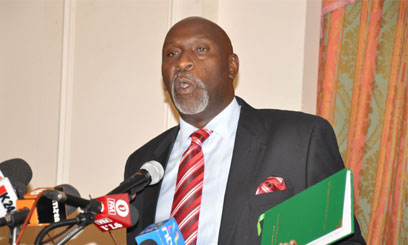NAIROBI, Kenya, Jul 29 – Amendments being made to crucial Bills by the Cabinet are kicking up a storm with the Commission for the Implementation of the Constitution (CIC) terming them unconstitutional.
The CIC said that the amendments to the Independent Electoral and Boundaries Commission Act (IEBC), the Political Parties Bill and article 59 Bills raise serious constitutional concerns.
CIC Chairman Charles Nyachae explained that the IEBC Act contravenes the Constitution by dictating stringent terms on which the electoral commission should operate.
The Act states, in part, that the Commission shall use as primary reference material the report of the former Boundaries Commission as tabled before the National Assembly as well as the report of the Parliamentary Committee on the report of the former Boundaries Commission.
“It directs the Commission on the manner in which it will carry out its constitutional mandate contrary to Article 249 (2) which grants the Commission independence from any person or authority,” said Mr Nyachae.
“If retained in the form proposed, the Section would hinder the Commission from curing any defects of a constitutional nature that may be contained in the Boundaries Commission report or the Parliamentary report,” he argued.
Mr Nyachae further listed articles 1, 2 and 3, under the fifth schedule of the IEBC Act, as those that were in breach of the Constitution. He also said that the Salaries and Remuneration Commission had no authority to set the pay packs of public officers as set out in Article 19 (1) of the IEBC Act.
He argued that the Salaries and Remuneration Commission was only supposed to set the allowances of state officers.
“Section 2(a), under the fifth schedule of the IEBC Act, mandates the Commission to review administrative units whereas Article 89, of the Constitution, which grants the IEBC the authority of reviewing boundaries makes no mention of administrative units,” he observed.
He added that his commission had raised the matter before the IEBC Bill was enacted into law but that the concerns were overlooked. Mr Nyachae explained that he had written an advisory to the Justice Minister, the Speaker and Clerk of the National Assembly as well as the Chairman of the Constitution Implementation Oversight Committee.
He also said that he copied the advisory to the Head of Civil Service who doubles as the Cabinet secretary as well as the Permanent Secretary in the Office of the Prime Minister.
“The offending Sections were listed in our advisory opinions which we had sent to the relevant Parliamentary Committee before the IEBC Bill was enacted but we noted that the issues we raised were not addressed,” he explained.
The CIC Chairman also cited other concerns in the Political Parties Bill, which was published on July 15, saying it disallows post election coalitions. The Bill has not yet been enacted into law as it has to be tabled in Parliament for debate before being forwarded to the President for assent.
“This restriction goes against the spirit of Article 108 of the Constitution which contemplates coalitions which can occur before or after the elections. It should include a provision allowing post election coalitions and providing a 30 day period within which they can be entered,” he said.
Mr Nyachae also argued that the facilitative Bills of the Kenya National Human Rights and Equalities Commission (KNHREC), the Ombudsman Commission and the National Gender Commission, were pre-mature as Parliament had not yet decided whether or not to merge these commissions as laid out in Article 59 of the Constitution.
The former Kenya National Commission on Human Rights (KNCHR) wants one merged commission formed while the National Gender and Equalities Commission wants the commissions separated. According to the CIC Chair, these issues ought to be sorted out before the effecting Bills are enacted.
“KNCHR makes a case for only one commission with support of some civil society organization while members of both the former Commission on Gender and Development (CGD) and the Public Complaints Standing Committee made a case for three stand alone commissions,” he said.










































